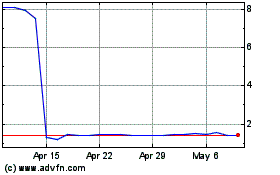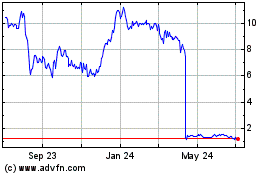Marinus Pharmaceuticals Initiates Phase 3 Study in Children with PCDH19-Related Epilepsy
March 06 2019 - 7:30AM

Marinus Pharmaceuticals, Inc. (Nasdaq:MRNS) (“Marinus” or
“Company”), a biopharmaceutical company dedicated to the
development of innovative therapeutics to treat epilepsy and
neuropsychiatric disorders, today announced that it is initiating a
single global pivotal Phase 3 clinical study (Violet Study)
evaluating oral ganaxolone in children with PCDH19-related epilepsy
(PCDH19-RE), a rare genetic epilepsy. If successful, the Violet
Study is intended to support the regulatory filings for approval of
ganaxolone in this underserved and refractory patient population.
The Violet Study is a global, double-blind,
randomized, placebo-controlled pivotal Phase 3 clinical study
evaluating ganaxolone in children with PCDH19-RE. The study will
enroll up to 70 patients between the age of 1 and 17 with a
confirmed PCDH19 mutation. All patients that meet eligibility will
be stratified into one of two biomarker groups and randomized
(ganaxolone or placebo) within each stratum. The trial will consist
of an 8-week prospective baseline period to collect seizure data,
followed by a 17-week double-blind treatment phase. Patients
randomized to ganaxolone will titrate over four weeks to a dose of
up to 600 mg of ganaxolone oral liquid suspension three times a day
and maintain that dose for the following 13-weeks. After the
double-blind period, all patients who meet certain eligibility
requirements will have the opportunity to receive ganaxolone in an
open label phase of the study. The Company expects to begin
screening patients for enrollment into the study in the second
quarter of 2019 and data from the study are estimated to be
available in 2021.
“Following our End-of-Phase 2 meeting with the
FDA and Scientific Advice from the EMA, we are extremely excited at
the prospect of incorporating a potentially clinically useful and
predictive neurosteroid biomarker into our clinical trial,” said
Dr. Lorianne Masuoka, Chief Medical Officer of Marinus. “We believe
this could be the beginning of a targeted, personalized treatment
for patients suffering from rare genetic epilepsies. A neurosteroid
biomarker that can predict response may have potential applications
in epileptic conditions beyond PCDH19. This new pivotal study in
PCDH19 along with our on-going Phase 3 trial in CDKL5 Deficiency
Disorder (Marigold Study) strengthens Marinus’ commitment to rare
forms of refractory pediatric epilepsy with no approved
therapies.”
In the Company’s open-label phase 2 clinical
trial in 11 patients with PCDH19-RE, patients receiving ganaxolone
experienced a 25% decrease in median seizure frequency compared to
baseline. At the American Epilepsy Society Annual Meeting in
December 2018, the Company reported additional data which
identified preliminary evidence of a plasma neurosteroid biomarker
that correlated with seizure response in 10 of the 11 PCDH19-RE
patients treated with ganaxolone. The post-treatment review of
baseline plasma neurosteroid levels in patients with PCDH19-RE
revealed a significant association between these neurosteroid
levels and response to ganaxolone treatment. Patients with a very
low level of a specific neurosteroid level showed a medically
notable reduction in median seizure frequency of 50% (n=7) compared
to an 84% increase in median seizure frequency seen in patients
with a very high level of the same specific neurosteroid (n=4). The
difference in the levels of the neurosteroid between responders and
non-responders was approximately 1.5 orders of magnitude. This
clinical finding corroborates the scientific rationale for
ganaxolone to provide a benefit to patients with very low levels of
an allopregnanolone associated neurosteroid.
Marinus has received orphan drug designation for PCDH19.
More information on the Violet Study will be
available at
https://www.marinuspharma.com/for-patients-families/pcdh19-related-epilepsy
or www.clinicaltrials.gov.
About PCDH19-related Epilepsy
Protocadherin 19 -related epilepsy (PCDH19-RE)
is a serious and rare epileptic disease characterized by highly
variable early-onset cluster seizures with comorbid cognitive and
behavioral disturbances with or without intellectual disability.
About 1 in 10 girls who begin having seizures before the age of 5
has PCDH19-RE. The features of PCDH19-RE can overlap or look
similar to the features in Dravet Syndrome. It is estimated that
there are approximately 10,000–12,000 children worldwide with
PCDH19-RE.
Currently, there are no approved therapies for
PCDH19-RE. Any therapy that reduces the frequency, duration or
severity of seizures may positively impact quality of life for the
child and family.
About Ganaxolone
Ganaxolone, a positive allosteric modulator of
GABAA, is being developed in three different dose forms
(intravenous, capsule and liquid) intended to maximize therapeutic
reach to adult and pediatric patient populations in both acute and
chronic care settings. Unlike benzodiazepines, ganaxolone exhibits
anti-seizure and anti-anxiety activity via its effects on synaptic
and extrasynaptic GABAA receptors. Ganaxolone has been studied
in more than 1,600 subjects, both pediatric and adult, at
therapeutically relevant dose levels and treatment regimens for up
to four years. In these studies, ganaxolone was generally safe and
well-tolerated. The most commonly reported adverse events were
somnolence, dizziness and fatigue.
About Marinus
Pharmaceuticals
Marinus Pharmaceuticals, Inc. is a
biopharmaceutical company dedicated to the development of
ganaxolone, which offers a new mechanism of action, demonstrated
efficacy and safety, and convenient dosing to improve the lives of
patients suffering from epilepsy and depression. Ganaxolone is a
positive allosteric modulator of GABAA that acts on a
well-characterized target in the brain known to have anti-seizure,
anti-depressant and anti-anxiety effects. Ganaxolone is being
developed in three different dose forms (IV, capsule and liquid)
intended to maximize therapeutic reach to adult and pediatric
patient populations in both acute and chronic care settings.
Marinus has initiated the first ever pivotal studies in children
with CDKL5 deficiency disorder and PCDH19-related epilepsy and is
currently conducting studies in women with postpartum depression
and patients with refractory status epilepticus. For more
information visit www.marinuspharma.com. Please follow us on
Twitter: @MarinusPharma.
Forward-Looking Statements
To the extent that statements contained in this
press release are not descriptions of historical facts regarding
Marinus, they are forward-looking statements reflecting the current
beliefs and expectations of management made pursuant to the safe
harbor provisions of the Private Securities Litigation Reform Act
of 1995. Words such as “may”, “will”, “expect”, “anticipate”,
“estimate”, “intend”, “believe”, “is planning”, and similar
expressions (as well as other words or expressions referencing
future events, conditions or circumstances) are intended to
identify forward-looking statements. Examples of forward-looking
statements contained in this press release include, among others,
statements regarding our interpretation of preclinical studies,
development plans for our product candidate, including the
development of dose forms, the clinical trial testing schedule and
milestones, the ability to complete enrollment in our clinical
trials, interpretation of scientific basis for ganaxolone use,
timing for availability and release of data, the safety, potential
efficacy and therapeutic potential of our product candidate and our
expectation regarding the sufficiency of our working capital.
Forward-looking statements in this release involve substantial
risks and uncertainties that could cause our clinical development
programs, future results, performance or achievements to differ
significantly from those expressed or implied by the
forward-looking statements. Such risks and uncertainties include,
among others, the uncertainties inherent in the conduct of future
clinical trials, that results of preclinical studies or earlier
clinical trials are not necessarily predictors of future results in
later preclinical studies or clinical trials, the timing of the
clinical trials, enrollment in clinical trials, availability of
data from ongoing clinical trials, expectations for regulatory
approvals, the attainment of clinical trial results that will be
supportive of regulatory approvals, and other matters, including
the development of formulations of ganaxolone, and the availability
or potential availability of alternative products or treatments for
conditions targeted by the Company that could affect the
availability or commercial potential of our drug candidates.
Marinus undertakes no obligation to update or revise any
forward-looking statements. For a further description of the risks
and uncertainties that could cause actual results to differ from
those expressed in these forward-looking statements, as well as
risks relating to the business of the Company in general, see
filings Marinus has made with the Securities and Exchange
Commission.CONTACT:Lisa M. CaperelliExecutive Director, Investor
& Strategic RelationsMarinus Pharmaceuticals,
Inc.484-801-4674lcaperelli@marinuspharma.com
Marinus Pharmaceuticals (NASDAQ:MRNS)
Historical Stock Chart
From Mar 2024 to Apr 2024

Marinus Pharmaceuticals (NASDAQ:MRNS)
Historical Stock Chart
From Apr 2023 to Apr 2024
